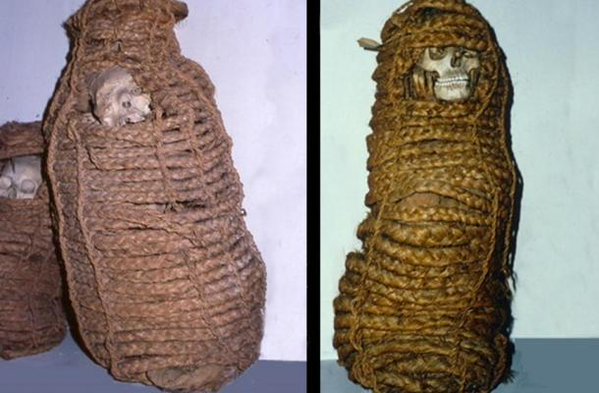Archaeologists stunned by discovery of antibiotic resistance in 1,000-year-old mummy


A free daily email with the biggest news stories of the day – and the best features from TheWeek.com
You are now subscribed
Your newsletter sign-up was successful
Alexander Fleming discovered penicillin, the first antibiotic, in 1929, almost a 1,000 years after the death of one scientifically intriguing woman recently found in the Andes Mountains. As researchers examined the woman's mummified body, they discovered something surprising: In her gut were bacteria containing antibiotic-resistant genes, even though she had lived long before Fleming ever made his petri dish discovery.
The mummy, who was naturally preserved due to the cold climate in the Andes, was found in Cuzco, the ancient Inca Empire capital, in a basket with an opening so her head could be seen. She was probably hung in a family tomb, as was customary. After being found, the basket mummy was brought to Italy for study, Discovery News reports.
Having died between the ages of 18 and 23, the woman showed signs of chronic Chagas' disease, a condition caused by a parasite that is transmitted by a bloodsucking insect. She also had bacterial diseases and some types of human papilloma virus, or HPV, a sexually transmitted virus. Her heart, esophagus, and colon were much larger than is normal and the Chagas' disease appeared to be her likely cause of death. However, she seemed to have survived for some time even after the swelling of her organs because she was being treated with drugs, probably coca leaves.
The Week
Escape your echo chamber. Get the facts behind the news, plus analysis from multiple perspectives.

Sign up for The Week's Free Newsletters
From our morning news briefing to a weekly Good News Newsletter, get the best of The Week delivered directly to your inbox.
From our morning news briefing to a weekly Good News Newsletter, get the best of The Week delivered directly to your inbox.
But even if she'd been alive today, there would have been little relief for the basket mummy's bacterial illnesses because of the genes of the bacteria themselves: They are resistant to modern broad-spectrum antibiotics including fosfomycin, chloramphenicol, tetracycline, quinolones, and vancomycin. Vancomycin, which was only discovered a little over 50 years ago, has grown to be antibiotic-resistant in recent years, with many experts blaming the increased use, or misuse, of the antibiotic. However, as the basket mummy from Cuzco shows, antibiotic-resistant genes have existed in some bacteria for at least a thousand years or longer.
A free daily email with the biggest news stories of the day – and the best features from TheWeek.com
Jeva Lange was the executive editor at TheWeek.com. She formerly served as The Week's deputy editor and culture critic. She is also a contributor to Screen Slate, and her writing has appeared in The New York Daily News, The Awl, Vice, and Gothamist, among other publications. Jeva lives in New York City. Follow her on Twitter.
-
 How the FCC’s ‘equal time’ rule works
How the FCC’s ‘equal time’ rule worksIn the Spotlight The law is at the heart of the Colbert-CBS conflict
-
 What is the endgame in the DHS shutdown?
What is the endgame in the DHS shutdown?Today’s Big Question Democrats want to rein in ICE’s immigration crackdown
-
 ‘Poor time management isn’t just an inconvenience’
‘Poor time management isn’t just an inconvenience’Instant Opinion Opinion, comment and editorials of the day
-
 Nobody seems surprised Wagner's Prigozhin died under suspicious circumstances
Nobody seems surprised Wagner's Prigozhin died under suspicious circumstancesSpeed Read
-
 Western mountain climbers allegedly left Pakistani porter to die on K2
Western mountain climbers allegedly left Pakistani porter to die on K2Speed Read
-
 'Circular saw blades' divide controversial Rio Grande buoys installed by Texas governor
'Circular saw blades' divide controversial Rio Grande buoys installed by Texas governorSpeed Read
-
 Los Angeles city workers stage 1-day walkout over labor conditions
Los Angeles city workers stage 1-day walkout over labor conditionsSpeed Read
-
 Mega Millions jackpot climbs to an estimated $1.55 billion
Mega Millions jackpot climbs to an estimated $1.55 billionSpeed Read
-
 Bangladesh dealing with worst dengue fever outbreak on record
Bangladesh dealing with worst dengue fever outbreak on recordSpeed Read
-
 Glacial outburst flooding in Juneau destroys homes
Glacial outburst flooding in Juneau destroys homesSpeed Read
-
 Scotland seeking 'monster hunters' to search for fabled Loch Ness creature
Scotland seeking 'monster hunters' to search for fabled Loch Ness creatureSpeed Read
